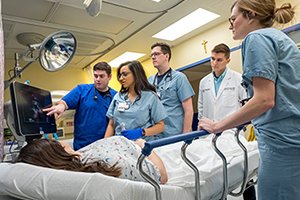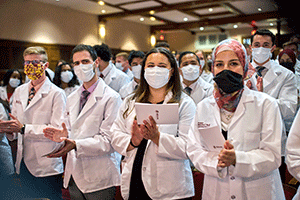12 careers in healthcare
Imagine stepping into a busy hospital. As you walk through the halls, you notice the diverse groups of professionals, each playing an important role in the patient recovery journey. From the front desk to the operating room, the hospital is a hub for the healthcare industry, offering a glimpse into the many career pathways available. Get ready to take a tour that highlights key roles and the education or training required to pursue them.
Thinking about a career in healthcare? Explore the programs offered at Central Michigan University and apply today.
The front lines: patient interaction roles
 These professionals are the face of healthcare, often the first point of contact for patients. They ensure that patients receive the care and attention they need from the moment they enter the hospital. Whether administering medication, assisting with daily tasks or managing administrative duties, these roles are critical in maintaining smooth and compassionate patient care.
These professionals are the face of healthcare, often the first point of contact for patients. They ensure that patients receive the care and attention they need from the moment they enter the hospital. Whether administering medication, assisting with daily tasks or managing administrative duties, these roles are critical in maintaining smooth and compassionate patient care.
Registered Nurse (RN)
- Overview: RNs are often the first point of contact for patients. They assess patient needs, administer medication and provide care coordination.
- Registered nurse education: Associate’s degree in nursing (ADN) or Bachelor of Science in Nursing (BSN).
- Licensing: Passing the NCLEX-RN exam.
- Registered nurse salary: The median annual wage for RNs was $86,070 in 2023.
Certified Nursing Assistant (CNA)
- Overview: CNAs support RNs by assisting with daily patient care, such as bathing, dressing and feeding patients.
- Certified Nursing Assistant education: Completion of a state-approved education program, typically a few weeks to months.
- Certification: Passing a competency exam.
- Certified Nursing Assistant salary: The median annual wage for nursing assistants was $38,200 in 2023.
Medical Assistant (MA)
- Overview: MAs perform both administrative and clinical tasks, from scheduling appointments to taking vital signs.
- Medical Assistant education: Certificate or diploma from a postsecondary institution, often completed in about a year.
- Certification: Optional but can be obtained through carious organizations like the AAMA.
- Medical Assistant salary: The median annual wage for medical assistants was $42,000 in 2023.
Behind the scenes: technical and diagnostic health roles
 These are the professionals that work behind the scenes, ensuring accurate diagnosis and successful surgical outcomes. They play an important role in the healthcare system by operating complex equipment, analyzing test results and maintaining a sterile environment during surgeries. Their technical expertise and attention to detail is vital in supporting doctors and nurses. With specialized education and certifications, these roles require an understanding of medical procedures and the technology that supports them.
These are the professionals that work behind the scenes, ensuring accurate diagnosis and successful surgical outcomes. They play an important role in the healthcare system by operating complex equipment, analyzing test results and maintaining a sterile environment during surgeries. Their technical expertise and attention to detail is vital in supporting doctors and nurses. With specialized education and certifications, these roles require an understanding of medical procedures and the technology that supports them.
Radiologic technologist
- Overview: These professionals perform diagnostic imaging examinations, such as X-rays, MRIs and CT scans.
- Radiologic technologist education: Associates degree in radiologic technology.
- Licensing/certifications: State licensure is required, and certification can be obtained from the AART.
- Radiologic technologist salary: The median annual wage for radiologic technologist was $76,020 in 2023.
Medical Laboratory Technician (MLT)
- Overview: MLTs analyze bodily fluids and tissues to help diagnose diseases.
- Medical Laboratory Technician education: Associate's degree in clinical laboratory science.
- Certification: Certification through organizations like the ASCP is often required.
- Medical Laboratory Technician salary: The median annual wage for clinical laboratory technologists and technicians was $60,780 in 2023.
Surgical technologist
- Overview: Surgical technologists assist in the operating room, ensuring that the environment is sterile and that all surgical instruments are ready for use.
- Surgical technologists education: Certificate or associate's degree from an accredited program.
- Certification: Optional but recommended through organizations like the NBSTSA.
- Surgical technologist salary: The median annual wage for surgical technologists was $60,610 in 2023.
The decision-makers: advanced clinical roles
 These healthcare roles consist of the professionals at the forefront of care, making decisions that guide treatment plans and improve patient outcomes. Physicians, Nurse Practitioners and Physician Assistants hold advanced degrees and have deep expertise. Their roles involve a high level of responsibility, often overseeing other healthcare staff and coordinating care plans.
These healthcare roles consist of the professionals at the forefront of care, making decisions that guide treatment plans and improve patient outcomes. Physicians, Nurse Practitioners and Physician Assistants hold advanced degrees and have deep expertise. Their roles involve a high level of responsibility, often overseeing other healthcare staff and coordinating care plans.
Physician
- Overview: Physicians diagnose and treat illnesses, prescribe medication and oversee patient care.
- Physician education: Doctor of Medicine (MD) or Doctor of Osteopathic Medicine (DO).
- Licensing: Passing the USMLE or COMPLEX exams, followed by residency training.
- Physician salary: The median wage for physicians is equal to or greater than $239,200 per year.
Nurse Practitioner (NP)
- Overview: NPs are advanced practice registered nurses who provide primary and specialty care, often with more autonomy than RNs.
- Nurse Practitioner education: Master of Science in Nursing (MSN) or Doctor of Nursing Practice (DNP).
- Licensing/Certification: Certification in a specialty area and state licensure are required.
- Nurse Practitioner salary: The median annual wage for nurse practitioners was $129,480 in 2023.
Physician Assistant (PA)
- Overview: PAs practice medicine under the supervision of a physician, diagnosing and treating illnesses.
- Physician Assistant education: Master’s degree from an accredited PA program.
- Certification: Passing the PANCE exam.
- Physician Assistant salary: The median annual wage for physician assistants was $130,020 in 2023.
The support network: administrative and non-clinical roles
Behind every successful healthcare facility is a support network that ensures operations run smoothly and efficiently. Healthcare administrators, health information managers and medical billing and coding specialists play crucial roles in managing the business side of healthcare. They oversee everything from facility management and patient records to financial operations, enabling clinical staff to focus on patient care.
Healthcare administrator
- Overview: Healthcare administrators manage the operations of healthcare facilities, ensuring they run smoothly and efficiently.
- Healthcare Administrator education: Bachelor’s or master’s degree in healthcare administration or a related field.
- Certification: Optional certifications are available, such as the Certified Healthcare Executive (CHE) credential.
- Healthcare Administrator salary: The median annual wage for medical and health services managers was $110,680 in 2023.
Health information manager
- Overview: These professionals oversee the management of patient records and health information systems.
- Heath information manager education: Bachelor's degree in health information management or a related field.
- Certifications: Registered Health Information Administrator (RHIA) certification is recommended.
- Health information manager salary: The median annual wage for medical and health services managers was $110,680 in 2023.
Medical billing and coding specialist
- Overview: These specialists ensure that healthcare providers are accurately reimbursed by processing patient data and submitting claims to insurance companies.
- Medical billing and coding education: Certificate or associate’s degree in medical billing and coding.
- Certification: Certification from organizations like the AAPC or AHIMA is recommended.
- Medical billing and coding salary: The median annual wage for medical records specialists was $48,780 in 2023.
What healthcare job is right for me?
 As you wrap up your hospital tour, it is clear that healthcare is a field full of opportunities. Each role, from the nurses at the bedside of patients to the technologists behind the scenes, requires specific training and education. Whether you’re drawn to direct patient care, technical work or administrative duties, there’s a pathway in healthcare that can lead to a career you will love. Now, the question is: what corridor will you choose to walk down?
As you wrap up your hospital tour, it is clear that healthcare is a field full of opportunities. Each role, from the nurses at the bedside of patients to the technologists behind the scenes, requires specific training and education. Whether you’re drawn to direct patient care, technical work or administrative duties, there’s a pathway in healthcare that can lead to a career you will love. Now, the question is: what corridor will you choose to walk down?
Why choose CMU?
At Central Michigan University, your healthcare journey starts with hands-on learning in a state-of-the-art facilities, guided by supportive faculty who are as passionate about your success as you are. Whether you’re practicing technical skills in the lab or diving into real-world clinical experiences, CMU offers healthcare pathways that you will need to build a strong foundation for your healthcare career. At CMU, we’re here to help you every step of the way!